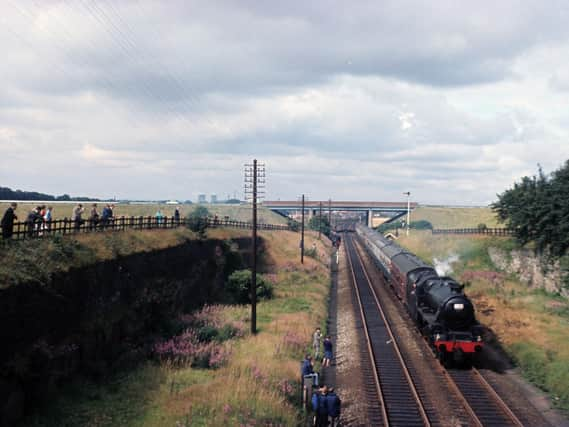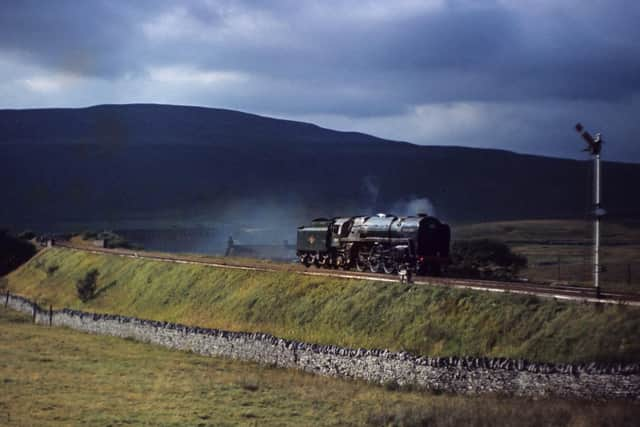On board Lancashire's final steam train journey


In its last few months of operation, steam had been concentrated in the North West, the cradle of the steam-worked main line, for it was here in 1830 where it all began between Manchester and Liverpool.
There was the odd steam passenger turn which survived to August 3, 1968, when the 2048 from Preston to Blackpool South and the 2124 to Liverpool Exchange bowed to the inevitable.


Advertisement
Hide AdAdvertisement
Hide AdI travelled on the former, the last train to have originated in London to be steam-hauled for part of its journey, a portion off the 1705 London Euston-Carlisle.
There was also a glut of rail tours in those last three months of steam. Number 70013 Oliver Cromwell – the last Britannia Pacific to remain in service – was in high demand, along with a supporting cast of mainly Black 5s, taking steam all over the North West.
One of the most notable, perhaps, was that of July 21, 1968, when the Roch Valley Railway Society ran steam four ways Manchester-Southport, a remarkable achievement then, let alone now. A day I drove many miles around Lancashire from Parbold to Burscough Junction by way of Copy Pit on the edge of Yorkshire, and then back overnight to my home in Plymouth!
Living in the west of Devon, as I still do, it was quite an effort to cover the end of steam in the North West. A minimum of 10 hours each way driving my little 100E car was the norm, something I did for six of the last 10 weekends of steam. There was no motorway until one reached Bristol, and neither one north of Carnforth.
Advertisement
Hide AdAdvertisement
Hide AdSo it came to August 11, 1968, when British Rail announced steam would end with the 15 Guinea Special running from Liverpool to Carlisle and back by way of the Settle and Carlisle.
My itinerary was quite simple, on the Saturday a leisurely drive up to Chester to stay with my friend, the late Keith Holt, calling in at Cheltenham on the way to photograph the remains of Malvern Road station for, at this time, the railway as well as dispensing with steam traction was an ever changing scene of run down and closures.
On the day itself, we made our way firstly to Parkside where the train was booked to stop by the Huskisson Memorial photographing Black 5 45110 arriving 10 minutes late on the first leg from Liverpool Lime Street to Manchester.
Remarkably, on a double track main line, many alighted by means of specially provided ladders to pay homage to the place where Mr Huskisson was hit by Stephenson’s Rocket, subsequently dying from his injuries.
Advertisement
Hide AdAdvertisement
Hide AdNo doubt in this day and age of health and safety such goings on would almost require an Act of Parliament.
At Manchester Victoria 45110 gave way to 70013 Oliver Cromwell for the onward journey to Carlisle.
For the 100E and its driver and eager passengers, a fairly hectic drive to Ribblehead, surely as iconic location as there is to mark such an occasion. In the middle of nowhere and high in the Pennines, the car was parked with some difficulty, for Ribblehead had not seen such crowds before, and I doubt since.
Half an hour late, at 13.58, 70013 came over the viaduct storming her way north, for once just a gentle breeze instead of the usual gale blowing where Ribblesdale and Chapel Le Dale meet.
Advertisement
Hide AdAdvertisement
Hide AdA glimpse of the sun and Pen-y-ghent for once clearly visible; Ribblehead is seldom so benevolent with its weather.
It would be the better part of three hours before the special returned, ample time to drive around to Dent Dale and make the stiff climb up to Arten Gill Viaduct.
Here at 16.50 and on time, Black 5s 44871+44781 headed south, their beat echoing around beneath Great Knoutberry Hill and Stonehouse Brow. They were booked to call at Blea Moor, just to the north of Ribblehead Viaduct, for water.
An extremely fast descent down the hill from Arten Gill and I have to admit to a somewhat speedy journey around the Pennine lanes and roads, we made it with seconds to spare to join the assembled multitude to photograph the special coming off Ribblehead Viaduct at 17.20, the sun playing shadow with the clouds.
Advertisement
Hide AdAdvertisement
Hide AdMost of the chasing camera pack dashed off to Liverpool to see the last rites, with 45110 running in with that final leg from Manchester Victoria.
Those of us in the know were aware that 70013 was to make its way back from Carlisle light engine about 45 minutes behind the special. We hung on as the Pennine cloud grew and hills darkened. As Oliver Cromwell came off Ribblehead Viaduct, the sun broke and a shaft of light lit up the engine with a sombre and dark Whernside providing a dramatic backdrop.
My last shot of BR working steam and one the best ever.
After that it was time to drop Mr Holt off in Chester where his wife provided a welcome dinner.
So the long overnight journey back to Devon, egg and chips at Severn Bridge Services at 03.00 to sustain the party, back home to a welcome bed at about 07.00 and back to work at 14.00 for a late turn in the Telegraph Office at Plymouth Station.
Advertisement
Hide AdAdvertisement
Hide AdIt had been a grand finale but poignant, for those of us from the South West an endurance test but it was worth the effort to be part of such an historic occasion. It was time perhaps to forget the sound of piston crank and hissing steam for steam was no more. Or so we thought at the time.
Bernard Mills is the author of Steam North West available from Fonthill priced £13.59 www.fonthill.media
